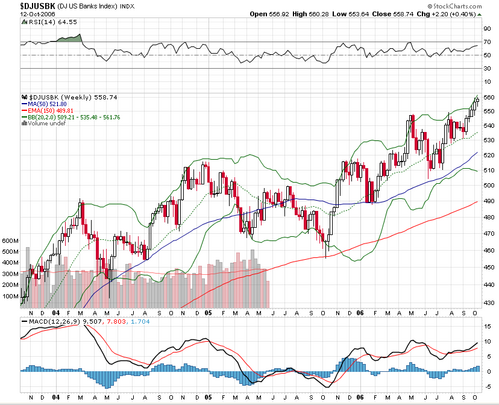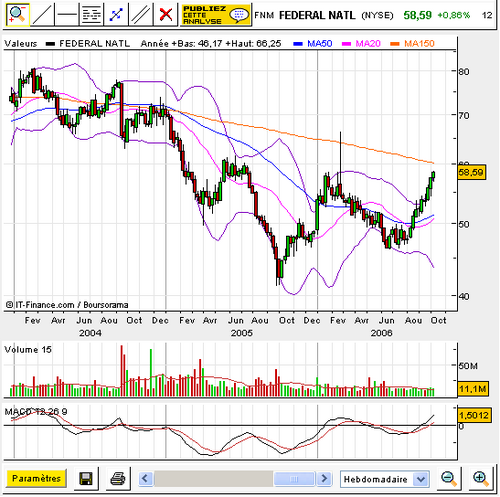IMMOBILIER US: PAS DE KRACH A L'HORIZON
Je vous propose aujourd'hui de faire le point sur le marché immobilier US, marché qui fait actuellement couler beaucoup d'encre car son effondrement aurait de graves conséquences dans le monde entier...
Dans le but de nous faire une opinion la plus objective possible, je vous propose d'étudier différents supports...
Commençons par le reit index, indice global du secteur immobilier US... (daily)

Même la pire des tanches peut voir sur ce graphique que l'indice se porte à merveille, le gros trou d'air du printemps n'est qu'un vieux souvenir....
Le marché n'anticipe donc pas de retournement du secteur...
Regardons maintenant ce que nous dit l'indice de la construction... (home construction index, daily)

Ici, c'est différent... cet indice a été quasiment divisé par deux! Le rebond entamé cet été semble correctif et le scénario le plus probable est une reprise ultérieure de la baisse...
Conclusion: Le marché de la construction a beaucoup souffert mais le marché immobilier, après avoir souffert lui aussi dans un premier temps s'est ressaisi et a totalement résorbé son déclin, le marché est confiant... attention toutefois si la baisse de l'indice de la construction reprennait, les choses pourraient changer...
Regardons maintenant ce qui se passe dans le monde des banques et du refinancement hypothécaire...

Du côté des banques, aucune inquiétude non plus...
Enfin, regardons se qui se passe du côté de Fannie Mae, première société de refinancement hypothécaire aux US... (données hebos).

Après la débandade de 2005, le titre s'est repris de belle manière... le débordement des 60$ libèrerait un potentiel de hausse intéressant... pas d'anticipation de krach de ce côté non plus...
Conclusion: En partant du principe que les marchés anticipent les évènements, il est clair qu'il n'y a et qu'il n'y aura aucun krach immobilier aux US dans les mois à venir... cependant, le monde de la construction est en pleine tempête et certains vont y laisser des plumes...
Maintenant, il est vrai que certains micro-marchés souffrent (cf presse US) mais dans son ensemble, le marché tient le coup malgré les hausses conséquentes de taux, comme en Angleterre...
Tout ça me laisse à penser, que le scénario le plus probable est un lent dégonflement et non un krach...
Pour la France, un krach me semble de plus en plus improbable également...je crois que le marché va se retourner tranquillement... (si on peut dire...)
La malédiction !
